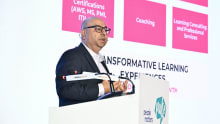Soft Skills are hard skills of today's workforce

Are technical or job-related skills enough to succeed in one's job? No doubt, they are a must but merely possessing them is not sufficient when it comes to progressing up the ladder.
Soft skills are increasingly becoming the hard skills of today's workforce. It's just not enough to be highly trained in technical skills, without developing the softer, interpersonal and relationship-building skills that help people to communicate and collaborate effectively.
With the traditional style of leadership becoming outdated, professional managers expect their teams to be more proactive and communicate openly. Also with the boom in the outsourcing industry, many professionals and subject matter experts have to directly deal with their clients based abroad on a regular basis. Their approachability and people skills are ultimately what sustain the contracts their employers have entered into.
I would say that attitude is actually only 10 per cent of what happens to you and 90 per cent of how you react to it. It shows us the readiness of an individual to solve problems proactively and thereby create healthy and positive work atmosphere within the organisation. It reflects on the ability of individuals to take ownership for their actions and lead from the front without giving up when it matters the most. It also represents an individual’s reaction to situations and his/her ability to look at things in the right perspective keeping in view the overall organisational interest. Most of the time, one is able to find people who have hard skills, i.e. the ability to handle or carry out the assignments or handle other tasks reasonably well, but many of them lack the soft skills that the company is looking for in them to be able to become successful senior level managers.
Soft skills help one to excel in the workplace and their importance cannot be undermined in this age of information, technology and knowledge. Professionals need to realise that once hired, they are going to be measured for promotions, assessments, assignments, salary increases and bonuses on their soft skills quotient as well. So, their ability to get along with others, selling their ideas, managing their time, executing assignments and keeping them under budget, creating an enjoyable and healthy workplace environment is now as important, if not more so, than their technical expertise. In that sense, it is becoming a game-changer today.
Some of the most sought after soft skills are:
Communication: How well one is able to express oneself both orally and in writing? It could be writing e-mails, making presentations or just being able to explain to team members, peers, superiors, clients etc.
Flexibility & Adaptability: Changes happen every day. Good managers should have the flexibility to deal with constant change. In fact, they expect change and plan for it. This helps them to react more quickly and minimise the disruption the changes can bring.
Taking directions well: Good managers have to figure out what needs to be done and go after it. There may still be times when they need to be told to do something. A good manager is not only able to accept the directions, but does so with a positive attitude and learns from them.
Dependability: Can you be depended upon where you need to be, to do what you say you will? It is important that your boss is able to depend on you. It is also equally important that your peers and subordinates also believe that they can depend on you or else you wouldn’t get their support to be successful. Leadership qualities teaches one this.
Time Management: This is one of the most important traits a good manager has to learn. The ability to prioritise and to delegate, which reduce the number of things one has to do, one also has to be able to maximise what he/she can get done in the time available.
Goal Setting: This helps in not just drifting through the day/week by just dealing with what lands on one’s table, it helps in figuring out what needs to be prioritised by setting specific goals not only for oneself but also for the team.
There is, of course, a lot of argument as to whether it is possible to enhance soft skills by attending a few hours of training, especially when one considers the fact that a person has lived with those traits all his life. It may be hard to digest but in reality a professional who wants to do well in his/her career does not really have a choice.
Unlike subjects such as accounting and financial management law, which can be taught in the class room and studied at home, soft skills need to be acquired through experiential learning and cannot be developed by merely reading textbooks. The skills that one gains will equip the individual to excel in his/her professional and personal life. It is a continuous learning process.
Soft skills are becoming more critical than ever as organizations struggle to find meaningful ways to remain competitive and be productive. Teamwork, leadership, and communication are underpinned by soft skills development. Since each is an essential element for organizational and personal success of professionals, developing soft skills is very important and does matter… a lot!










